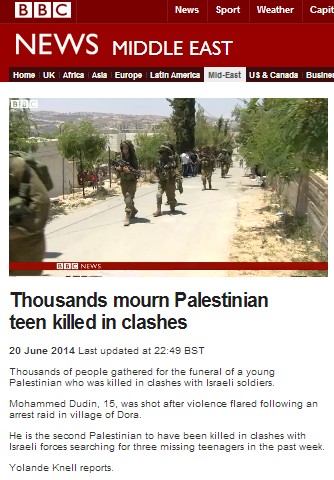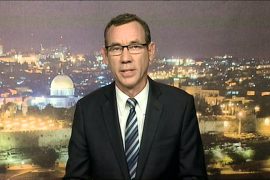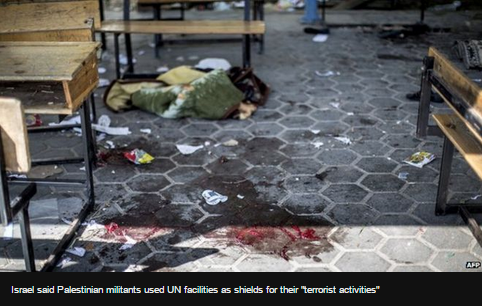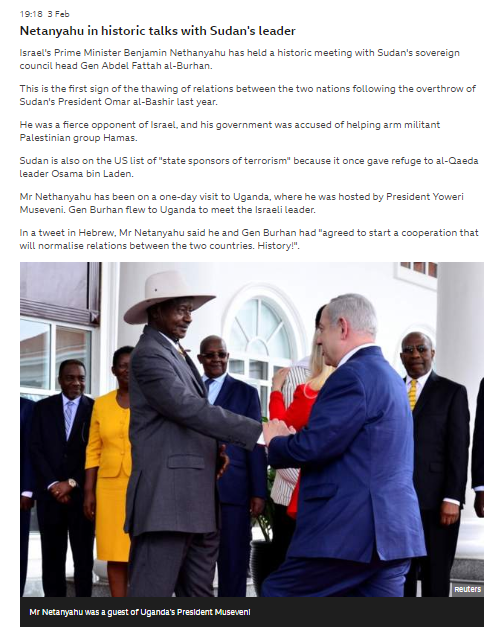On Friday June 20th a filmed report about the search for three kidnapped Israeli teenagers by the BBC Jerusalem Bureau’s Yolande Knell which appeared on BBC television news broadcasts was also posted on the BBC News website under the title “Thousands mourn Palestinian teen killed in clashes“.
Knell opens her report thus:
“Grief and anger at this funeral for a fifteen year-old boy. Mohamed Dudin was shot in the chest in the latest clashes with Israeli soldiers. Across the West Bank young Palestinians have thrown stones when troops have tried to make arrests.”
Knell fails to point out that rock-throwing has not been the only method used to attack Israeli soldiers involved in the search: firebombs and pipe-bombs have also been employed and in at least one case, a grenade was thrown at troops, injuring a soldier. The incident in Dura on the night between June 19th and 20th in which Mohamed Dudin was killed also involved rock and firebomb throwing by youths, but Knell refrains from providing audiences with that vital context.
The report then cuts to images of Israeli soldiers walking up a street, with Knell informing audiences in the voice-over:
“And this is what provoked their anger: a massive Israeli search operation began in Palestinian neighbourhoods a week ago to try to find three missing Israeli teenagers.”
In other words, Knell affords no agency or free will to those rioting Palestinian youths; according to her patronising account, their “anger” is uncontrollably “provoked” by the very sight of Israeli soldiers conducting an operation to rescue three abducted teens.
Adhering to the BBC policy adopted around the middle of the first week of searches, Knell continues by suggesting that there is room for interpretation regarding whether the three teens were actually kidnapped.
“They’re believed to have been kidnapped. The city of Hebron has been virtually closed by the Israeli army.”
Knell does not explain to audiences why Hebron has been closed. She fails to inform them that Hebron is a major centre of Hamas activity and that intelligence assessments suggest that the abducted teens are still being held in Palestinian Authority controlled areas.
“Speaking to Channel 10, the official said that, based on security assessments, the teens were still somewhere in the West Bank and that their abductors were unsuccessful in moving them in the direction of Jordan, Gaza, or Sinai.
Troops were concentrated in large numbers in an area close to Hebron on Friday night, with soldiers searching house-to-house and the area was closed off to outside traffic.”
The BBC report then cuts to two short interviews with unnamed ‘Palestinians in the street’, with BBC editors having elected to include promotion (unchallenged by the BBC) and amplification of the inaccurate claim that an Israeli search for kidnapped teenagers is “collective punishment”, along with a DIY interpretation of ‘international law’.
Woman: “So many people are worried and afraid that…ah….they might lose somebody from the family, either being detained, either being killed.”
Man: “It’s a big violation of the international law by imposing a collective punishment on the Palestinian civilians who are living in Hebron.”
Knell goes on, again using the neutral term “disappeared” to describe the kidnapped youths.
“But outside this home in central Israel thoughts and prayers are for the students who’ve disappeared. We spoke to the aunt of sixteen year-old Naftali Frenkel.
After that short interview Knell continues, erasing Hamas’ terror designation from the picture and again steering audiences towards an equivalent view of statements made on the basis of intelligence reports by an official of a sovereign country and claims made by an internationally designated terrorist organization.
“Israel’s Prime Minister says the missing teenagers have been taken by his country’s sworn enemy; the Islamist movement Hamas, although Hamas hasn’t said it was involved.”
The term “sworn enemy” is defined as meaning “people who will always hate each other”. In using that term, therefore, Knell misleads BBC audiences by steering them towards a view of Israel’s operations against Hamas as motivated by emotion – rather than by the legal obligation to defend its citizens from terrorist activity, as in fact the case.
Knell continues by suggesting that Israeli efforts to locate and rescue three of its citizens will be to blame for any potential collapse of the PUG, but fails to inform viewers of that government’s obligation under existing treaties to prevent exactly this kind of attack on Israelis.
“But all the Palestinian factions are feeling the pressure. Fury over the Israeli raids threatens to open fresh divisions and could break their new unity government. What began as a personal crisis for three Israeli families has quickly turned into a deadly political drama.”
Of course what Knell describes to viewers as a “personal crisis” was, from the very beginning, a politically motivated act. Gil-ad Sha’ar, Naftali Frenkel and Eyal Yifrach were not random victims; they were kidnapped because they are Israeli Jews.
A written article on the same topic (the seventh consecutive one) also appeared on the BBC News website on the same day under the headline “Palestinian killed as hunt for Israeli youths continues“.
In that report too, rioting and attacks instigated against Israeli soldiers are depicted as some sort of force majeure which is beyond the control of unsuspecting Palestinians who perpetrate them.
“Mohammed Dudin, 15, was shot after violence flared following an arrest raid in village of Dora [sic].” [emphasis added]
Yet again, the BBC refrains from informing audiences that the three teens were kidnapped even though it does later on mention the phone call made by one of the boys.
“A Palestinian teenager has been killed during clashes with Israeli troops searching for three Israeli teenagers believed abducted in the West Bank.
Hundreds of Palestinians have been arrested in the hunt for the teenagers, who went missing eight days ago.” [emphasis added]
[…]
“Earlier this week, the Israeli police revealed that one of the students had alerted them by phone, minutes after being kidnapped.”
Like its predecessor, this report once again inaccurately informs readers that:
“No group has claimed to have taken the students.”
In fact, there have been three claims of responsibility: one the day after the kidnapping from a Salafist Jihadist organization called Dawat al Islam, one the following day from a group calling itself the Liberators’ Battalion of Hebron and one two days after that by Fatah’s Al Aqsa Martyrs Brigade. Whilst all these claims are unverified, it is not accurate on the BBC’s part to state that no claims have been made.
As has been the case in all six previous reports on this topic, this article too makes no mention of Palestinian celebrations of the kidnappings or of the vast amounts of explosives and weapons discovered during the IDF’s searches. Concurrent missile attacks on Israeli civilians near the Gaza Strip are also not reported to BBC audiences in either of these reports.




